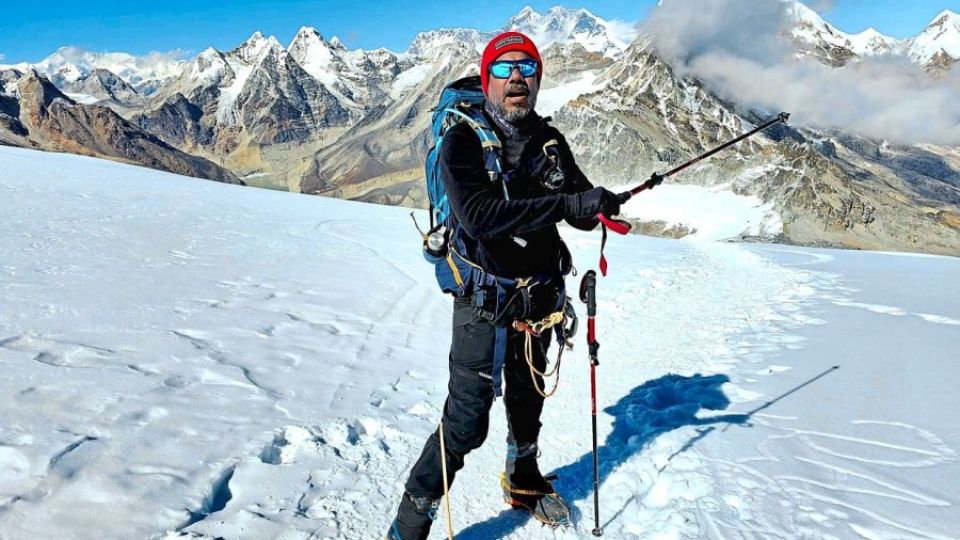November 8, 2023
KUALA LUMPUR – When his blood oxygen level dipped to 37%, Mohamed Sadik Abdul Kadir knew he was staring at death in the face.
During the Covid-19 pandemic, the Health Ministry strictly told patients in home quarantine to immediately dial 999 if their blood oxygen reading on the oximeter dropped to below 92%.
But there was no 999 for Mohamed Sadik to dial because he was 5,800m above sea level, dealing with temperatures below -10ºC.
He and three buddies were trying to conquer Mera Peak (6,476m), one of the mountains in the Himalayan range.
The magic that comes with conquering Mera Peak is that sitting there, you have an unobstructed and emotional view of the five highest mountains in the world: Everest (8,848m), Kangchenjunga (8,586m), Lhotse (8,516m), Makalu (8,485m) and Cho Oyu (8,201m).
Their adventure started on Oct 13 when they left Malaysia. They came home safely on Oct 28.
Of the four brave Malaysians, only Eric Pok, 50, made it to the peak.
Philip Yong, 64, and Vincent Chong, 52, pressed on until acute mountain sickness (AMS) got the better of them at 6,000m and they turned back.
Mohamed Sadik, 51, at the upper camp at 5,800m, already knew his AMS symptoms were too severe for him to carry on.
On the hike to the lower base camp, at around 4,000m, Mohamed Sadik’s first warning was an annoying headache.
“I took paracetamol for it,” he mused.
On the march to the upper camp, he recalled hallucinating – suddenly perceiving that he was in a desert, feeling intolerably hot despite being in sub-zero temperatures, and believing that the ice and snow were sand.
He laboriously sucked in air, but there was not enough oxygen in the thin atmosphere for him.
At the upper camp, the two Sherpa guides and his buddies helped him pitch his tent and put him in; his vision had blurred and he was becoming incoherent.
AMS is a medical condition suffered by those who ascend quickly to heights beyond 3,352m instead of spending many days acclimatising.
Humans dwelling in the lowlands have great difficulty adjusting, and for comparison, the Sherpa (highlanders) are born with more capillaries per square centimetre of muscle. They have bigger chests and greater lung capacities.
If left unchecked, a person with AMS can deteriorate to the point of developing fluids in the lungs and swelling in the brain, both of which are lethal.
Beyond 2,500m above sea level, experts advise ascending at a rate of no more than 300m to 500m a day and resting for a full day before continuing.
Above 4,000m, experts advise limiting further ascent to just 300m a day and resting for two days before soldiering on.
In Malaysia, only Mount Kinabalu (4,095m) might cause AMS. Other peaks in Malaysia are only slightly above 2,000m at most.
Lying in his tent, Mohamed Sadik recalled how images of his family members kept appearing before him.
“It’s true. When you are at risk of death, you see all your loved ones,” said Mohamed Sadik, who lives in Kuala Lumpur.
He had fuzzy memories of being fed a weak soup and some spaghetti, and he recalled being terrified of falling asleep for fear that he would never wake up.
But sleep did come, and he was told later that he had bad sleep apnea; his friends could hear him struggling for breath even while asleep, and they kept a constant vigil over him.
It turned out that a little food and some sleep went a long way because, on the next dawn, Mohamed Sadik began feeling better and soaked in the marvellous, rugged landscape.
When Eric returned after conquering the peak that day, the joy was electric.
“In the end, the race is only with yourself. We all shared Eric’s joy.
“I thought maybe with one more night’s rest, I could attempt the peak, but our Sherpa advised against it. They have seen people die there, so I chose to listen to them,” he said.
His quest is not over. Mohamed Sadik, who has loved going on all sorts of adventures since he was a kid, resolves to tackle Mera Peak again, maybe even next year.
“I run my own construction firm, so I am a little busy and perhaps did not spend enough time training. I’ll try harder next round and climb again,” he said.
He believes that people should challenge themselves and chase their dreams, yet always be ready to sound a retreat and try again later.
Mountaineers do not do what they do as recreation. They are driven by intrinsic motivation to embark on this challenging, highly risky pursuit.
On Oct 5, seasoned mountaineer Hazlami Ahmad Nizam, 33, a Kedahan living in Kuantan, perished on the way to Mera Peak.
On Oct 30, mountaineer Parthiban Kandasamy, 38, a Malaysian foreign diplomat, died while trekking to Everest Base Camp (5,364m) in Nepal.

